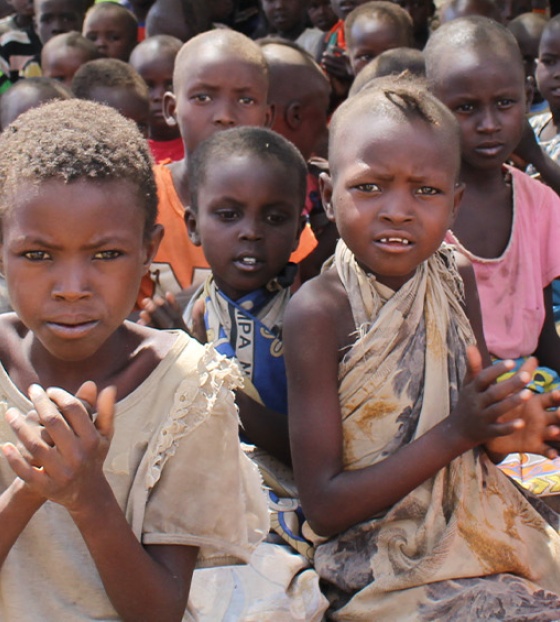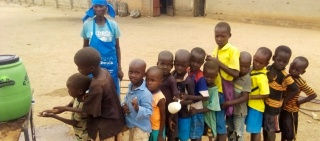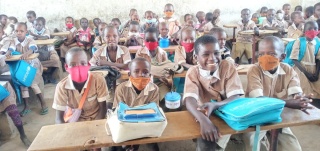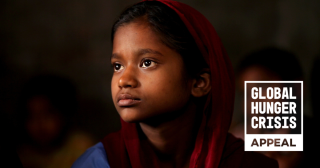

Where Others Will Not Go
In Turkana, the dangers and logistics of operating a school feeding programme are extreme.
Kenya, in the eastern part of Africa, is home to 56 million people. While there are plenty of prosperous areas (boosted by food production, tourism, and commerce), there are some regions were eking out a living from the barren landscape can seem impossible.
We have been working in Kenya since 2005, when we launched a modest programme to feed just a few hundred children through our partner, the Diocese of Lodwar. Today, the programme has grown to reach new children in increasingly challenging circumstances, and now feeds 139,426 hungry and vulnerable children every school day.
Reaching hungry children in vulnerable communities is never easy, but the situation in Turkana, which just over a million people call home, has been one of Mary’s Meals’ biggest challenges yet. What is perhaps most worrying is that the situation facing the communities that we have not yet reached is only getting worse.
For those who have not visited Turkana, it is hard to imagine such a place exists. Our Head of Programmes for Kenya, Claus Aluda, describes his first visit to the region as the most difficult trip he had ever made.
“Coming to Mary’s Meals has been quite a journey. It began before I’d even finished high school. We had a church trip to Turkana; I was only 16 years old at the time and the road was so difficult that we had to wait for five hours before we could set off because all vehicles had to travel in convoy. We had to stock up on fuel and food and have security with us because we were told that anything could happen along the way.
“Our journey took almost 10 hours and it was quite tense. I was looking on my left and right and there were no houses at all. All I could see were young children carrying guns, taking care of their livestock.
“We got to the church camp, and it was so hot! I’ve never had such an experience. And what shocked me most was when I looked at the ground, I never saw any piece of grass or vegetation – only stones, sand, some bushes and a few sheep. These images kept going through my mind and I kept asking myself: ‘What happens to the people here?’.
“I was born and lived in the Western part of Kenya, just slightly off Lake Victoria and about 400 or 500 kilometres from Turkana. I lived on my father’s large farm, we had a lot of food, I never imagined that such conditions would have existed, so it was a traumatic thing to see.”
This experience motivated Claus to study, research, volunteer and work in the development sector in Kenya. He spent many years working to support children before learning about Mary’s Meals. “Turkana is a place that had so many NGO’s (Non-Governmental Organisations) – the big names are all here, but I had never heard of Mary’s Meals.
“Since independence in Turkana more than 60 years ago, billions have been spent on aid, but without any result. So, when I came to Mary’s Meals, for me that was a driver. It was so enjoyable; it was the first job I’ve done where everything was so straightforward. Mistakenly, I thought it was very simple to do! I thought I just had to distribute food to children and that I would have some time on my hands! But the more I got into Mary’s Meals, the more I understood how different it is from all the organisations I had worked for before. And I’m still here, I’ve kept going.
“Meeting children, they confirm that honestly, if someone had not given them food, they would never have actually learned. Government officials say the same. My motivation has always been to be part of a movement that is helping children who would otherwise be neglected, to be part of a long-term solution to cyclic poverty and illiteracy.

As Head of Programmes, Claus has a difficult but critical role. He says his team must safeguard Mary’s Meals’ vision and make sure they remain on track with their strategic goal as a country to ensure that children receive their meals at school.
His responsibilities range from managing operations including the fleet of vehicles, the warehouse, food distribution and monitoring, to building up partnerships across the programme to achieve excellence. As with so much in Mary’s Meals, our relationships and partnerships with all involved are key to the successful delivery of the programme.
“Mary’s Meals is the first place I have seen volunteering work. For the 11 years that I have worked in the development sector, I was used to seeing people that have to be paid to do anything, it just creates a total dependency. When I came to Mary’s Meals, I was very afraid about how it was expected to work! Especially in Turkana because people here are so needy, they felt they had nothing to offer. But the more I listened and studied the approach, the more confident I became. I’ve seen our support base of volunteers grow and grow. There are now more than 4,000 volunteers supporting the programme here every day.
“Perhaps the biggest part of my role is to make sure that my team and the programme really build up the capacity of volunteers and make sure that we have that commitment throughout, build their confidence up and increase their understanding of the value of education. This is the community engagement, and it is so important.
“One really interesting result of this community engagement is around kitchen and storeroom construction. We have seen volunteers construct traditional storerooms so that they are able to store their food. It was a difficult thing at first, we didn’t know if it would happen. But at no cost at all, the communities do it on their own. We have seen this ripple effect in other communities too; in areas we have not been able to reach, people come and say to us: ‘Could you kindly reach us, we know your conditions are that you need a storeroom and a kitchen [to start the programme], here is a photo, we have already constructed one, just let us know when you can come!’”
The reality is that communities are making these approaches and building kitchens and storerooms without any guarantee of meals because the situation they face is getting worse.“Turkana is a vast area, there is no rain. I can always remember the exact dates it rained; last year it was the 17th and 18th April and the year before, it was 31st August. The drought is terrible, and here families depend on livestock and livestock become very prone to death when there is no water. And there is nothing else people can do. They cannot farm, there is illiteracy so they cannot work, you know they depend on aid. There are high poverty levels, it’s the poorest area within Kenya – 85% of the population are very, very poor, with nothing at all.
“Honestly, the situation is very worrying, right now we are in a drought situation. A month ago, it deteriorated from an ‘alarm phase’ into an ‘alert phase’ so we are getting into an emergency. I have just seen it reported in some areas, with the households that keep animals, all have lost at least 50% of their livestock. So, it’s becoming very difficult and the environmental issues and climate change are already affecting us by default.
“There is also insecurity because Turkana borders South Sudan, Ethiopia and Uganda and there are internal borders too with Pokot. The borders are where we have some rain so there is some grass and so everyone takes their animals there and then they are attacked and everything is taken from them. There is always fighting and rustling around these areas.”
Mary’s Meals makes conscious decisions to reach children in areas that others cannot or will not go; to serve those who would otherwise be forgotten. However, we recognise that delivering this ourselves –as we do with the majority of the meals in Kenya – is not always the best approach.
Where we have identified otherwise inaccessible communities that are in desperate need of help, we work with a trusted team of partners to get into areas we could not reach on our own. The borders of Turkana are a strong example of this, where we continue to work with the Diocese of Lodwar.
“When I started, the Diocese were feeding in around 36 centres, but it is now 117. They have a very strong network through churches and their management in regions of Turkana where there are more security issues.
“This partnership is really important. There are areas of Turkana that, even after five or ten years, Mary’s Meals would not be able to reach with direct delivery. The logistics are just impossible, but the children are still in need. So, our partnership is helping us to reach the children that are most in need in these unique and difficult settings.
“The road networks are very difficult, the terrain itself requires smaller light trucks that can carry 1.5 tonnes and there are areas that even the trucks cannot reach. And there are shootouts. At any time, you can encounter bandit attacks, and the risk is too high. Whereas the Diocese of Lodwar is working in these areas and are well-known. The kind of vehicles they use are marked by the community, so even if there is an attack, the kind of community engagement and pastoral work they do means the risk to them is always very minimal. And we’ve actually never had an incident. They have pastoral teams, for example nuns, who are dedicated to working in these specific areas and they are able to assist us with our monitoring and they can feed this back to us through the Diocese.”
Whether delivering meals directly or working with partners to do so, the need across the areas of Kenya where we work is clear. It would be easy to think that the problem is too big and the challenges too grave to make an impact, but Claus sees the positive difference that Mary’s Meals is already making every day.
“I could speak to you all day about impact. It’s a long, long list, honestly. But the most direct one is, of course, that we have been able to tackle hunger and children are assured of a meal. Secondly, it is just being able to address the worry that happens – the myriad of issues that occur when there is food insecurity. Parents are no longer worried and stressed because their children are hungry, because their children are crying and there is nothing they can do about it. You can imagine that difficult situation, Mary’s Meals is really helping the communities to breathe a big sigh of relief.
“The other bigger impact of Mary’s Meals is the change in the value system towards education. Initially children would stay at home; boys would go to herd the animals and the girls would be prepared for marriage. But we have seen the evidence of the high numbers of enrolment, and these keep increasing and increasing. The communities now value education.

“The communities have also changed their behaviour and attitudes. Over the past 60 years, this community has had supporters give them everything. And then after two or three years, the support goes and the community are back in the same place. But through Mary’s Meals, we have seen behaviour change whereby communities have learned that no matter what situation they are in, there is something they can do to support themselves. We have seen that through the 4,000+ volunteers who work with us. They are able to come to the school, they are able to participate and contribute their time and their efforts. They have put up structures. They know they can do something to support their children and they trust us to keep our promise.
“When we began the programme, we realised there were many informal schools that had been closed, because without food nothing can happen. But another benefit of the school feeding programme we have seen is that many of them have reopened and are now feeding.
“Our other impact is that we have been able to influence policy and decision making within the government. They have always said clearly to us: ‘I wish we could be like you and emulate how you monitor and manage the food that you have.’ So, we have shown government and other leaders that it is possible to have integrity and to be good stewards. We are always invited to any government engagements including national policy decision making in the areas of school feeding and early childhood education.
“Infrastructure is also improving as a result of our work. We have been able to put pressure on the government by saying that we are providing meals yet they are not providing quality education. Just before the Covid-19 pandemic started, the government in Turkana employed 200 new teachers for the schools there.
“So directly and indirectly the impact is just wide and it’s immense. It’s quite overwhelming.” With places like Turkana already reeling from Covid-19, suffering the effects of the rising cost of living and bearing the brunt of the climate crisis, we must go forward with renewed commitment to reaching the next child and ensuring that none are forgotten. Overseeing the feeding programme from the dusty arid land of Turkana, Claus knows this more than most.
“My number one dream is to keep the commitment to the children we already serve, so that at no point he children we already serve miss a meal. My second dream matches our global desire to try to make sure we can reach the next child and the many others in our area who still remain in need.
“Finally, I dream of seeing the capacity and ability of communities and the government to carry on school feeding. Not just in the areas we are operating, but also in other areas of need. Because there is a lot of suffering and it is a whole missed generation. If a child does not go to school, their children will not go to school and it’s a generational issue. I really hope that can be reversed.”
With your help, we can continue to serve the children who already receive Mary’s Meals in Kenya. We can and we must keep the promise we have made to them and their communities.
The time to act is now.
